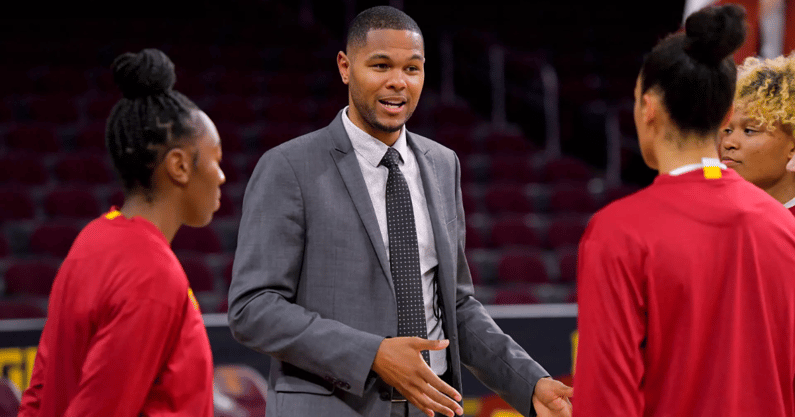Wendale Farrow’s Deep Admiration for Dawn Staley: A Story of Leadership, Charisma, and Unwavering Dedication to South Carolina Women’s Basketball
When Wendale Farrow first encountered Dawn Staley, his impression was nothing short of remarkable. From the very beginning, he saw in her a rare combination of leadership, charisma, and an unshakable dedication to the South Carolina women’s basketball program. This initial encounter set the stage for a relationship and admiration that would only grow stronger with time. To truly understand the depth of Farrow’s respect for Staley, it’s essential to explore what made her stand out so profoundly in his eyes, the qualities she embodied, and the lasting impact she made on the program, the players, and the entire basketball community at South Carolina.
From the moment they met, Farrow was struck by Staley’s commanding presence. She was not just a coach; she was a leader who carried herself with confidence and purpose. Leadership in sports, especially at the collegiate level, requires much more than tactical knowledge or motivational speeches — it demands a personality that inspires trust, instills discipline, and nurtures growth. Farrow recognized all these traits in Staley immediately. She had a natural ability to rally her team, to bring out the best in each player, and to foster a culture of accountability and excellence.
Charisma was another hallmark of Staley that Farrow noted with admiration. There’s something magnetic about individuals who can engage others effortlessly, who communicate not just with words but through energy, presence, and authenticity. Staley’s charisma transcended the typical boundaries of a coach-player relationship. It made her approachable yet respected, someone who could motivate through both sternness and genuine care. Farrow saw this as a crucial factor in the transformation of the South Carolina women’s basketball team, where players didn’t just follow her because they had to, but because they wanted to.
Equally important was Staley’s dedication. Farrow witnessed firsthand her relentless commitment to the program. This was a woman who didn’t just clock in and out; she lived and breathed South Carolina basketball. Her work ethic was infectious. Farrow observed her long hours of preparation, her meticulous attention to detail, and her constant efforts to improve every facet of the team’s performance. This dedication wasn’t limited to game strategy; it extended to player development, academic support, and community involvement. Staley’s holistic approach showed Farrow how deeply invested she was in building not just athletes, but well-rounded individuals who would succeed on and off the court.
The impact of this initial impression went beyond just Farrow’s personal view. It resonated with everyone involved in the program — from players and assistant coaches to administrative staff and fans. Staley’s leadership style fostered a positive and winning environment that cultivated resilience and teamwork. Farrow noted how her presence uplifted morale and created a strong sense of unity within the team. She challenged her players to push their limits while providing them with the support and encouragement needed to grow. Farrow saw her not merely as a coach but as a mentor and a pillar of strength.
Moreover, Staley’s influence extended to reshaping the identity of South Carolina women’s basketball. Prior to her arrival, the program had experienced ups and downs, struggling to maintain consistent success. Farrow saw in her the potential to turn things around, to create a legacy of excellence that would last for years to come. Her strategic vision and ability to recruit top talent raised the team’s profile nationally. Farrow admired how Staley’s values and philosophy became synonymous with the program’s culture, turning South Carolina into a formidable force in collegiate women’s basketball.
Farrow also appreciated Staley’s ability to handle pressure and adversity with grace. Coaching at a high level involves intense scrutiny, high expectations, and inevitable setbacks. Yet, Staley remained composed and focused, leading by example and teaching her team resilience. Farrow was impressed by how she transformed challenges into opportunities for growth, instilling a mindset of perseverance in her players. Her poise under pressure reinforced Farrow’s belief in her exceptional leadership qualities.
Beyond the technical and tactical aspects, Farrow recognized the human side of Staley’s coaching. She genuinely cared for her players as individuals, understanding their struggles, aspirations, and dreams. Farrow saw how she took the time to build personal relationships, to mentor players through difficult times, and to celebrate their successes, no matter how small. This compassion made her leadership authentic and deeply impactful. For Farrow, this blend of professional excellence and personal care set Staley apart from many others in the sport.
Reflecting on that initial impression years later, Farrow would say that it was a glimpse into the kind of legacy Dawn Staley was destined to create. The qualities he admired—her leadership, charisma, dedication, and humanity—have only grown stronger over time, solidifying her status as one of the most influential figures in women’s basketball. Farrow’s respect for Staley is rooted not just in what she has achieved, but in who she is: a transformative leader who inspires greatness, builds character, and changes lives.
In sum, Wendale Farrow’s initial impression of Dawn Staley was far more than a fleeting thought; it was a profound recognition of a leader whose presence could alter the course of a program and elevate a community. Staley’s unique blend of qualities—her commanding leadership, magnetic charisma, unwavering dedication, and heartfelt care for her players—made a lasting impact on Farrow and on South Carolina women’s basketball. This first encounter laid the foundation for a deep admiration and respect that continues to define how Farrow views one of the greatest coaches in the sport today.



